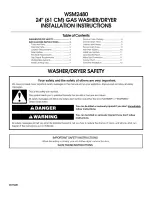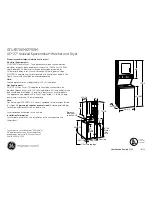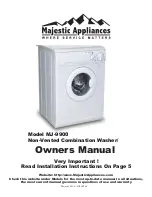
1 8
Part 5
ELECTRICAL REQUIREMENTS FOR ELECTRIC DRYERS
The following are additional instructions regarding electrical connections and requirements for electric dryers.
Warning:
The wiring and grounding must conform to the latest edition of the National Electrical Code,
ANSI/NFPA 70 and all applicable local regulations. Please contact a qualified electrician to check your home’s
wiring and fuses to ensure that your home has adequate electrical power to operate the dryer. Failure to do so can
result in fire or electrical shock.
120V/ 240V, 60 Hertz, 3-Wire Installation
Instructions for Grounding of your Electric
Dryer:
a) This dryer must be connected to a grounded
metal, permanent wiring system or an
equipment-grounding conductor must be run
with the circuit conductors and connected to the
equipment-grounding terminal or lead on the
dryer.
b) The dryer has its own terminal block that must
be connected to a separate 60 Hertz single
phase AC circuit, fused at 30 Amperes (the
circuit must be fused on both sides of the line).
ELECTRICAL SERVICE FOR THE DRYER
SHOULD BE OF MAXIMUM RATE
VOLTAGE LISTED ON THE NAMEPLATE.
DO NOT CONNECT DRYER TO 110, 115,
OR 120 VOLT CIRCUIT.
c) If branch circuit to dryer is fifteen feet (4.50 m)
or less in length, use U.L. (Underwriters
Laboratories) listed No. 10 A.W.G. wire (copper
wire only), or as required by local codes. If over
fifteen feet (4.50 m), use U.L. (Underwriters
Laboratories) listed No. 8 A.W.G. wire (copper
wire only), or as required by local codes. Allow
sufficient slack in wiring so dryer can be moved
from its normal location when necessary.
d) The power cord (pigtail) connection between
wall receptacle and dryer terminal block IS NOT
supplied with dryer. Type of pigtail and gauge of
wire must conform to local codes and with
instructions mentioned on the following pages.
e) The method of wiring the dryer is optional and
subject to local code requirements. Refer to
examples on next page.
f) You must select the method by which to wire
your dryer according to local code and ordinance
requirements. Sample methods are included in
the following pages.
















































